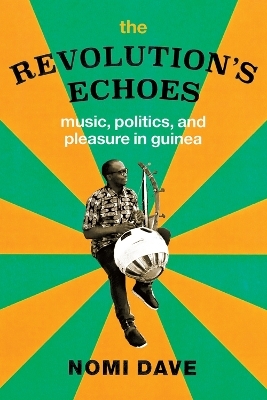
The Revolution's Echoes
Music, Politics, and Pleasure in Guinea
Seiten
2019
University of Chicago Press (Verlag)
978-0-226-65463-8 (ISBN)
University of Chicago Press (Verlag)
978-0-226-65463-8 (ISBN)
Music has long been an avenue for protest, seen as a way to promote freedom and equality, instill hope, and fight for change. Popular music, in particular, is considered to be an effective form of subversion and resistance under oppressive circumstances. But as Nomi Dave shows us in The Revolution's Echoes, the opposite is also true--music can often support, rather than challenge, the powers that be.
Examining fifty years of history in Guinea, Dave introduces readers to the music supporting the authoritarian regime of former president S kou Tour , and to the musicians who, even long after his death, have continued to praise dictators and avoid dissent. Dave shows that this isn't just the result of state manipulation--even in the absence of coercion, musicians and their audiences take real pleasure in musical praise of leaders. Time and again, whether in traditional music or in newer genres such as rap, Guinean musicians have celebrated state power and authority. With The Revolution's Echoes, Dave insists that we must grapple with the uncomfortable truth that some forms of music choose to support authoritarianism, generating new pleasures and new politics in the process.
Examining fifty years of history in Guinea, Dave introduces readers to the music supporting the authoritarian regime of former president S kou Tour , and to the musicians who, even long after his death, have continued to praise dictators and avoid dissent. Dave shows that this isn't just the result of state manipulation--even in the absence of coercion, musicians and their audiences take real pleasure in musical praise of leaders. Time and again, whether in traditional music or in newer genres such as rap, Guinean musicians have celebrated state power and authority. With The Revolution's Echoes, Dave insists that we must grapple with the uncomfortable truth that some forms of music choose to support authoritarianism, generating new pleasures and new politics in the process.
Nomi Dave is assistant professor of music at the University of Virginia. She previously trained as a human rights lawyer and worked on issues of refugee and immigrant rights and women's rights in the United States and Guinea.
| Erscheinungsdatum | 27.09.2019 |
|---|---|
| Reihe/Serie | Chicago Studies in Ethnomusicology |
| Sprache | englisch |
| Maße | 152 x 229 mm |
| Themenwelt | Kunst / Musik / Theater ► Musik ► Allgemeines / Lexika |
| Kunst / Musik / Theater ► Musik ► Musiktheorie / Musiklehre | |
| Sozialwissenschaften ► Ethnologie | |
| Sozialwissenschaften ► Soziologie | |
| ISBN-10 | 0-226-65463-X / 022665463X |
| ISBN-13 | 978-0-226-65463-8 / 9780226654638 |
| Zustand | Neuware |
| Informationen gemäß Produktsicherheitsverordnung (GPSR) | |
| Haben Sie eine Frage zum Produkt? |
Mehr entdecken
aus dem Bereich
aus dem Bereich
die Geschichte der Schallplatte
Buch | Hardcover (2024)
Prestel (Verlag)
36,00 €
Orientalismus, Rassismus und kulturelle Aneignung in Disneys …
Buch | Softcover (2024)
Unrast Verlag
19,80 €


